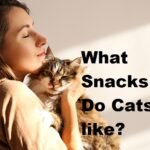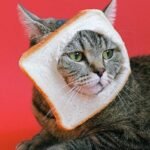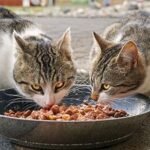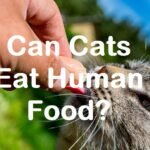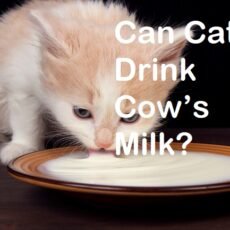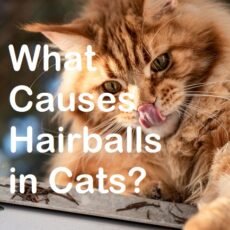Can cats eat dog food? It is one of those reoccurring questions most veterinarians hear from feline owners. Although the straightforward answer to this question is yes, there is more you need to know.
Cats are pretty different from dogs in terms of nutritional needs. So, while a taste of dog food will not harm your cat, it doesn’t add to their dietary requirements.
Can cats eat dog food? What are the benefits?
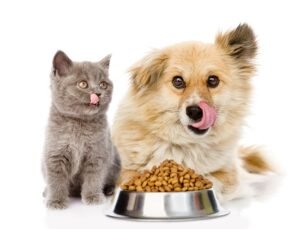 Dogs and cats are humans’ best companions. However, our feline and canine friends are very different regarding behavior and nutritional needs.
Dogs and cats are humans’ best companions. However, our feline and canine friends are very different regarding behavior and nutritional needs.
Dogs are omnivores, meaning their diet can oscillate between animal and plant products. On the other hand, cats are carnivores which implies that they thrive on a diet of meat-based proteins and animal fats for their body to function optimally.
The implication of this is that a commercial food that is complete and balanced for a dog would be nutritionally imbalanced for cats.
The differences between cat food and dog food
The formulation in cat food and dog food is different. Here is a quick look at some of them;
1. Protein
Cats are obligate carnivores, so they need high amounts of protein to stay healthy. Unfortunately, while some dog food contains high protein levels, they do not have as many protein concentrations found in cat food.
2. Taste
Cats cannot sense sweetness due to their low number of taste receptors. For this reason, cat food is specifically designed to be highly delicious for cats to eat.
3. Taurine
Dog food does not always contain taurine because dogs can produce it themselves. Cats require taurine to survive, and unfortunately, their bodies cannot make it. Cats that lack taurine in their diets may suffer the loss of vision, digestion problems, and weakened hearts. Today, all commercially available cat food has taurine in them.
4. Vitamin A
Cats need vitamins as a dietary supplement. However, they are unable to produce it on their own. Therefore, while dog food contains vitamin A, this is never enough to support the optimal nutritional requirements of cats.
5. Niacin
Just like other essential nutrients, cats cannot produce niacin, so they rely on well-formulated cat food for it. Unfortunately, dog food would not give cats the proper levels of niacin they need.
6. Arachidonic acid
Cats cannot create this fatty acid, so they must rely on specially formulated cat food to get this essential nutrient.
Is it safe for cats to eat dog food?
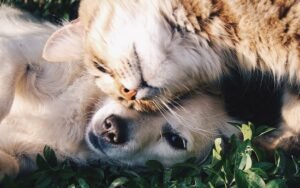 A morsel of dog food would not do any harm to cats. However, there is some vital information you need to know;
A morsel of dog food would not do any harm to cats. However, there is some vital information you need to know;
1. Every cat is distinct with differing tolerances
A cat’s tolerance for food varies. While some cats may consume specific food without a problem, others may eat the same and experience several health issues.
2. Dog food is only safe for healthy cats
Cats with health challenges shouldn’t eat dog food. It can adversely affect their health and not provide the nutrients they need to get better.
3. Serving size and frequency are important
Cats who develop a long-term habit of eating dog food instead of cat food will be deprived of the nutrients their bodies require, and their health will deteriorate.
Are there foods on the market suitable for both dogs and cats?
Our view shared throughout this article is that commercial pet food products are each formulated for a specific type of animal.
Having said that, there are products sold where the manufacturer claim that their formulas are suitable for both dogs and cats.
Although, we are not an advocate of these products, we have found a product from Wysong that appears to consider the ingredient requirements for felines as well as canines in their recipe.
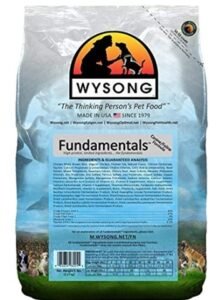 The Wysong canine/feline dry food is high in protein and has included probiotics, vitamins and minerals, and taurine. Its first ingredient is chicken meal, not real chicken meat (which would be our preference).
The Wysong canine/feline dry food is high in protein and has included probiotics, vitamins and minerals, and taurine. Its first ingredient is chicken meal, not real chicken meat (which would be our preference).
The ingredient list indicates 15% fat from chickens. This is a high fat content, which may not suit inactive cats or cats that are prone to obesity.
Pet owners have given it an average rating of 4.4 STARS.
Wysong Canine/Feline Formulated Dry Food
Life stage and pet food
The Association of American Feed Control Officials helps monitor and regulate the pet food industry.
AAFCO collaborates with the Food and Drug Administration (FDA) to determine which pest food are considered complete and balanced for a particular life stage.
AAFCO-certified foods are whole and balanced for the life stages indicated. Feed felines only AAFCO-approved cat food. Scrutinize the food label for information on life food information.
Choose a food label for growth or all life stages if you have a kitten, pregnant cat, or nursing cat. There are three main groups of life stages in the pet food industry. They include:
- Growth
- Maintenance
- All life stages
Cats have specific overall protein, vitamin, and nutritional needs, which vary throughout their life stages.
Fast-growing kittens require more nutrients and energy sources, whereas older healthy cats require more protein to help keep their muscles in good shape as they age.
Due to its low protein and other nutrient deficiencies, dog food cannot sustain a cat in any of its life stages.
What food should cats eat?
Cats need to consume a high-quality diet to stay healthy. Commercial cat food comes in various forms: dry, canned, and raw.
These are very different from dry, canned, and natural dog food. You can feed your cat an all-wet diet to keep her hydrated and reduce carbohydrate intake.
Cat food is usually lower in carbohydrates than dog food. The reason is that cats do not require carbohydrates to thrive, and a high carb intake can lead to diabetes and obesity in cats.
Interestingly some cats prefer dry food to wet food. You would have to gradually transition to wet food if you want your cat to eat a healthy and complete diet.
Some feline lovers are turning to raw food to feed their cats. Those who advocate raw food for cats argue that the diet is similar to what cats eat in the wild.
Although many cats enjoy eating raw food, there are risks associated with feeding raw meat. Many cats can digest and tolerate food-borne pathogens in raw food.
However, humans in the home can get exposed to these pathogens due to cross-contamination.
What should you do if your cat eats dog food?
An occasional bite of dog food by your cat shouldn’t be a source of worry. However, you would have to observe your cat for problems such as weight loss, vomiting, diarrhea, inappropriate defecation and urination, and other signs of illness.
If you notice your cat eating large amounts of dog food frequently, you should seek advice from your veterinarian. In addition, your cat may require an examination and lab test to assess her overall health.
Make it difficult for your cat to find dog food by keeping it out of their reach. Remove bowls of leftover food and avoid free-feeding your cats and dogs in the house.
Can cats eat dog food? Final Thoughts
The best way to meet your cat’s nutritional needs is to provide them with high-quality cat food.
While dog food is not harmful to cats, it lacks the dietary supplements to support healthy living in our feline friends.

